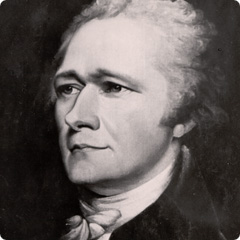 I'm reading Alexander Hamilton by Ron Chernow and it is fascinating. I didn't know much about Hamilton (still don't), but that he was a key figure early in our history, first Secretary of the Treasury, and a political manipulator (and on the $10 bill). I'm just starting the book, but it has blown me away from the beginning.
I'm reading Alexander Hamilton by Ron Chernow and it is fascinating. I didn't know much about Hamilton (still don't), but that he was a key figure early in our history, first Secretary of the Treasury, and a political manipulator (and on the $10 bill). I'm just starting the book, but it has blown me away from the beginning. Hamilton was born into a difficult situation in Nevis in the Carribean. His illegitimacy was something that he worked hard to avoid throughout his life - and it was the beginning of his pain during his earlier years. Chernow writes: "Let us pause briefly to tally the grim catalog of disasters that had befallen these two boys [Alexander and his brother] between 1765 and 1769: their father had vanished, their motehr had died, their cousin and supposed protector had committed bloody suicide, and their aunt, uncle, and grandmother had all died" (p. 26).
Despite this start, Hamilton seized every opportunity he could find to better his situation and make his mark. He was largely self-taught and put himself "out there" when opportunity knocked. His amazing talent was, thankfully for all of us, recognized by different people who put him in further positions to succeed. Still, he didn't take these opportunities for granted. He made the most of them. (He didn't want to go to Princeton because he wanted to go through school at an accelerated pace.) He was, in Stephen Covey's terminology (see Leadership Tab), proactive. He made things happen.
The point: We all have our challenges from our past. Some are huge. Some are insignificant by comparison, but they may be significant to us all the same. So here's something to think about. Where do you need to be proactive in your personal life? Work life? Other?
I'm not far into the story, but I know Hamilton is far from perfect. But we can certainly see an exceptional example of someone being proactive and not being defined by their situation. I've been encouraged and challenged by this brilliant man who was determined to make a difference.